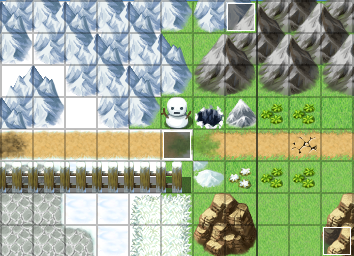Game Data
-
$data_actors
Contains all the RPG::Actor objects (all available actors) and their Actor settings (name, nickname, face, face_id, class, etc)
-
$data_classes
Array of RPG::Class objects which contain Class settings such as exp_for_level, exp_params, learnings and params.
-
$data_skills
Array of RPG::Skill objects which contain Skill settings such as message1, message2, mp_cost, tp_cost, types and required types.
-
$data_items
Array of RPG::Item objects which contain Item settings such as if it is consumable, get_item_count, itype_id, key_item? and price.
-
$data_weapons
Array of RPG::Weapon objects which contain Weapon settings such as animation_id, performance and wtype_id.
-
$data_armors
Array of RPG::Armor objects which contain Armor settings such as atype_id and performance.
-
$data_enemies
Array of RPG::Enemy objects which contain Enemy settings such as actions, battler_hue, battler_name, drop_items, exp, gold and params.
-
$data_troops
Array of RPG::Troop objects which contain Troop settings such as members, name and pages.
-
$data_states
Array of RPG::State objects which contain State settings such as auto_removal_timing, chance_by_damage, max_turns, message1-4, min_turns, priority, remove_at_battle_end, remove_by_damage, remove_by_restriction, remove_by_walking, restriction and steps_to_remove.
-
$data_animations
Array of RPG::Animation objects with Animation settings such as animation1_hue, animation1_name, animation2_name, animation2_hue, frame_max, frames, name, position, timings, to_screen? and similar setters.
-
$data_tilesets
Array of RPG::Tileset objects with Tileset settings such as flags, id, mode, name, note and tileset_names.
-
$data_common_events
Array of RPG::CommonEvent objects with Common Event settings such as autorun?, id, list, name, parallel?, switch_id and trigger.
-
$data_system
RPG::System object which contains a plethora of System settings such as transport settings, armor types, battle details, currency unit, game title, follower settings, switches, etc.
-
$data_mapinfos
Hash of all the maps in the game in the form of MapID to RPG::MapInfo mappings.

